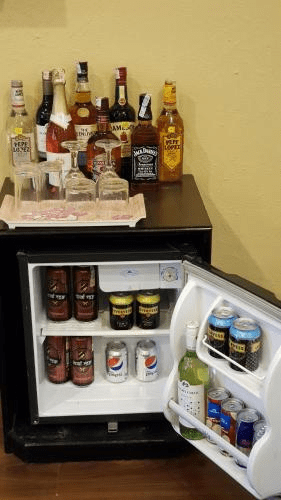
Clark County Cracks Down on Hotel Liquor Access—But Is This More Government Overreach?
By TheNevadaGlobeStaff, July 22, 2025 9:03 am
Clark County is tightening its grip on how adults consume alcohol in resort hotels, passing a new ordinance that expands liability and paperwork for property owners and guests alike. In a unanimous vote, the county commission approved measures requiring guests who keep alcoholic beverages in their rooms, skyboxes, or private movie booths to sign a formal agreement affirming they will prevent minors from accessing it.
At first glance, the goal—keeping alcohol out of kids’ hands—is widely supported. But the method? More paperwork, more regulation, and another example of government shifting responsibility onto private citizens and businesses under the guise of safety. Rather than empowering parents or enforcing personal accountability, this measure adds layers of liability for hotel operators and tourists.
Vincent Queano, the county’s Business License Director, admitted that their preferred solution—requiring locked liquor cabinets in every hotel room—was simply “unenforceable.” Not because it wasn’t a decent idea, but because the government doesn’t have the manpower to enforce it. So instead, they’ve opted for the next best thing: a legal waiver that hotels must now collect from each guest. If a guest refuses to sign, the alcohol is removed—regardless of their age or responsibility.
Visitors are already encountering this system. Tourists reported being surprised at check-in when asked to sign alcohol waivers. Some welcome the added caution, but it’s worth questioning whether it’s the job of local government to parent grown adults vacationing in Las Vegas. For now, guests who bring their own liquor are exempt, and hotels aren’t liable in those cases. Still, it raises a question: where does personal freedom end and red tape begin?
While the ordinance may mirror common practices in some venues, it’s another example of how incremental policies can pile up, gradually restricting everyday decisions in the name of prevention. Policies like this aren’t about catching bad actors—they burden everyone to account for the few. And that’s the danger in an ever-growing regulatory state.
Original source: 8 News Now
Copyright 2025 702 Times, NV Globe. All rights reserved.
- Melania Trump Honors America’s Heroes, Puts Love of Country Front and Center - February 15, 2026
- Broken Hearts and Broken Promises: A Valentine for Nevada Democrats - February 14, 2026
- Nevada’s Election Integrity Showdown Erupts as Voter ID and Mail Ballot Rules Take Center Stage - February 14, 2026




